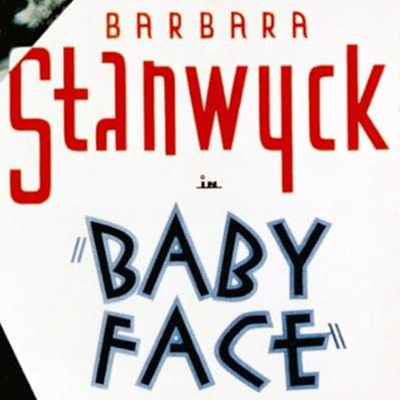There's a scene in Baby Face that ends up in every reel of highlights collected from Barbara Stanwyck's long career. Stanwyck plays Lily Power, the daughter of an Erie, Pennsylvania, speakeasy owner who has grown up too fast and too hard, and she's the object of the unwelcome attention of Ed (Arthur Hohl), a sleazy politician her father bribes to keep the police away from his business.
Ed is pawing her knee as she slouches in a chair when she casually reaches for a cup of coffee and pours it on his hand. "Oh, excuse me," she says as she stands up and adjusts her skirt. "My hand shakes so when I'm around you." The scene sums up what comprised the bedrock of Stanwyck's onscreen persona: a toughness she came by honestly, and which no other leading lady she'd compete with for the next three decades could embody so utterly.
Baby Face is an icon of pre-Code movies; in Complicated Women: Sex and Power in Pre-Code Hollywood, Mick LaSalle calls it a "perennial crowd-pleaser" and "the ultimate pre-code for pure outrageousness". It's reliably listed among "must-watch" pre-Code pictures, like this YouTube list that places it at the top, ahead of The Public Enemy, Call Her Savage and The Divorcee. But in his biography, Barbara Stanwyck: The Miracle Woman, Dan Callahan says that "Baby Face has a reputation for 'fun' that isn't borne out by the film itself; it's about as fun as Heart of Darkness."
The film's credits roll over a medley switching back and forth between the 1926 hit by Harry Akst and Benny Davis that provides the film's title and W.C. Handy's "St. Louis Blues", the 1914 blues and jazz standard. The Handy song, tragic and mournful, is more thematically appropriate to the film than the jaunty title tune, which has been covered by everyone from Eddie Cantor, Bing Crosby and Mitch Miller to The Kinks, The Muppets and Tiny Tim.
"Stanwyck, of course, never really had a 'baby face'," Callahan writes, "but that's part of the film's annihilating cynicism. The various men who use and are then used by her Lily Powers (that name!) never take the time to really look at her beyond her surface trappings of blond hair, warrior legs, and tip top figure (Stanwyck often holds her hand on her hips in this movie to emphasize her sleek, lithe body). 'You don't have to be beautiful,' Stanwick later claimed, referencing her own sex appeal. Then she joked, 'I have the face that sank a thousand ships.'"
We see men getting off their shifts at the steel plants heading up the stairs of a tenement to Lily's father's speakeasy, where she's the main attraction. She knows it, and when her father tries to fire Chico (Theresa Harris), a young black woman, she threatens to leave if he does. He's forced to back down, and Lily sullenly serves the sweaty men who grope her, gazing out from the window across to the smokestacks of the mills.
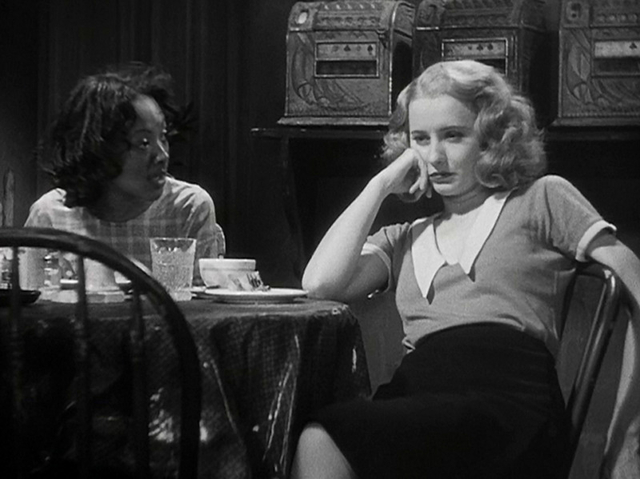
Harris' Chico is heard singing "St. Louis Blues" to herself all through the film; she was an actress, singer and dancer who suffered from the usual limited career prospects of black performers in Hollywood but nonetheless had a fascinating career. She played maid to everyone from Sylvia Sidney, Thelma Todd and Kay Francis to Bette Davis, Jean Harlow and Myrna Loy. She played Ginger Rogers' maid in Professional Sweetheart (1933) but despite a substantial role – her character substituted her singing voice for Rogers' radio performer – she was uncredited.
She had parts in classic films such as Horse Feathers, Gold Diggers of 1933, Jezebel and Out of the Past, and became a favorite of producer Val Lewton, who cast her in his pictures Cat People, I Walked with a Zombie, Phantom Lady and Strange Illusion. She had a disastrous marriage to a doctor who turned out to be a fence dealing in goods stolen by a client he supplied with morphine, but when she retired in the '50s she was able to live well off of money soundly invested playing maids in nearly a hundred movies.
The only speakeasy patron who doesn't paw Lily is Cragg (Alphonse Ethier), a cobbler and devotee of the philosopher Nietzsche, who encourages her to use her power as a young, attractive woman to take what she wants from men who will give it to her in what he judges to be a cold, pragmatic, transactional society. He presses Nietzsche's appropriately titled The Will to Power on her, and in a pep talk tells Lily that:
"You must be a master, not a slave. Look here – Nietzsche says, "All life, no matter how we idealize it, is nothing more nor less than exploitation". That's what I'm telling you. Exploit yourself. Go to some big city where you will find opportunities. Use men! Be strong! Defiant! Use men to get the things you want!"
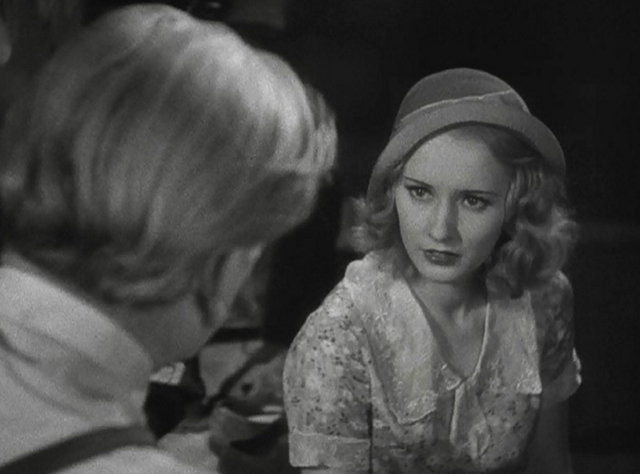
A minute after she breaks a beer bottle over the head of the sleazy politician her father had pimped her out to, an explosion in his backyard still kills her father and provides her with an excuse to leave Erie. Baby Face moves with the brisk pace of so many pre-Code films, rarely pausing for characters to reflect and develop; like Greek drama, fate has the heroes and heroines in its grasp and propels them toward outcomes they can rarely escape.
When MGM had a hit the year previous with Red-Headed Woman, starring Jean Harlow as a sexual mercenary, Warner Bros. production head Darryl F. Zanuck sold a treatment for a similar story to his cash-strapped studio for a dollar. Stanwyck, who had begun her career as a dancer on Broadway before rising to stardom there with roles in The Noose and Burlesque, was lured to Hollywood in 1927 only to get an uncredited part as a fan dancer in Broadway Nights, a silent film that has been lost.
Frank Capra and Ladies of Leisure (1930) provided her big break, and she spent the next three years playing a succession of young women who were lost, loose, dangerous or in peril in pictures like Illicit, Ten Cents a Dance, Night Nurse, Forbidden, Shopworn, The Purchase Price and Ladies They Talk About. In a crowded field of starlets competing for roles that required them to play wanton and show as much skin as censors would allow, she had already staked out a small but unique territory for herself that would grow into one of Hollywood's longest careers at the top of the marquee.
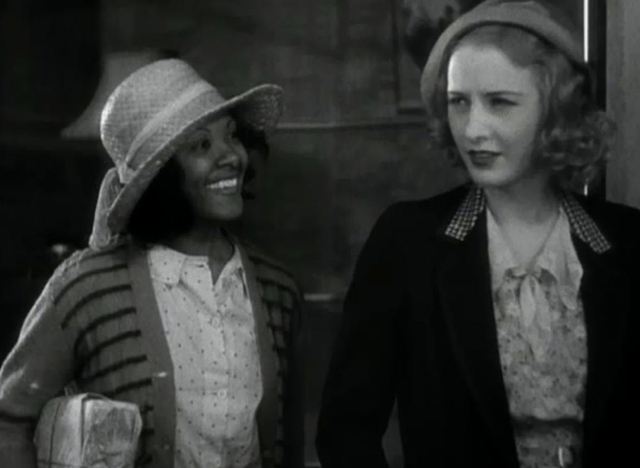
The original cut of Baby Face was so raw that significant cuts and alterations were made before it went into general release. The original version was considered lost until a print was discovered at the Library of Congress, and in that version Lily and Chico hop a freight train to New York City but get discovered by a railwayman. He's about to report them to the police when Lily makes him an offer ("Why don't we sit down and talk this thing out?") whose nature is clear.
(Zanuck said later that Stanwyck had a lot of input on the early scenes in the picture. You can only imagine what sorts of insights her own rough childhood would have provided.)
On the street in the big city, they're looking for any kind of opportunity when they come across the skyscraper headquarters of the Gotham Trust, a multinational bank. Lily sweet talks a cop into telling her where to apply for a job and makes another unmistakable transaction with Pratt (Maynard Holmes), a doughy junior clerk in the personnel department who gets her a job in filing.
Lily's rise up the floors of Gotham Trust is shown by the camera moving up the skyscraper, stopping at each step of the ladder Lily climbs with the aid of the men she uses and discards. In the filing department it's a young John Wayne as Jimmy, one of eleven roles he would play that year. Jimmy introduces Lily to Brody (Douglas Dumbrille) in mortgages, where she takes easily to the business of foreclosures.
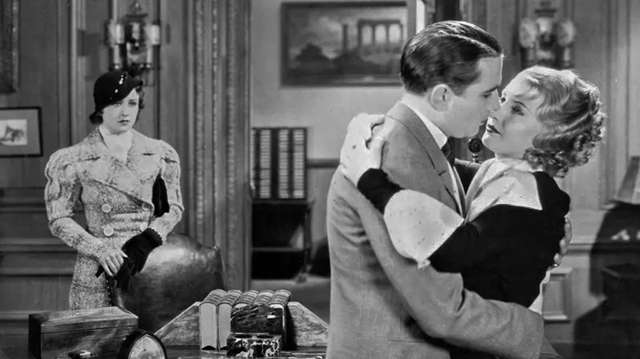
Her affair with Brody ends when Stevens (Donald Cook), a rising young executive engaged to the daughter of one of the bank's vice presidents, discovers them having sex in the ladies bathroom after office hours. Brody is fired but Lily ends up working in Stevens' office as an assistant to his secretary, who dislikes her but idolizes her boss, saying "He's not like other men. He has extraordinarily high ideals."
Stevens has, by this point, already begun an affair with Lily, who is now living in a luxurious apartment with Chico as her maid. When she gets a phone message at the office telling her that Stevens' fiancée is on her way to visit, she gets the secretary to leave early for lunch and makes sure that she's in Stevens' arms when the fiancée arrives.
Carter, Stevens' future father-in-law, is unusually understanding, suggesting he take some time off, but when he refuses to fire Lily, Carter offers to do the job himself. She agrees to leave her job but takes a new position as Carter's mistress; she upgrades to a penthouse apartment where she entertains the old man, using baby talk and calling him "fuzzy wuzzy" while telling Chico to "give the old boy Irish stew".
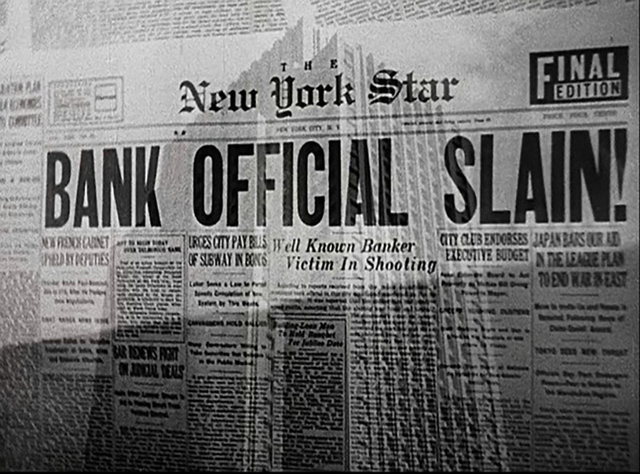
When Stevens, distraught and obsessed with Lily, barges into her apartment insisting that they elope, he discovers his father-in-law-to-be and shoots Carter before turning the gun on himself. Just before this scene Lily had received a gift from Cragg: another book by Nietzsche with the words "Crush out all sentiment" underlined. While startled by the gunshots, Lily takes in the aftermath of the murder-suicide, Stevens dead on the floor of her bathroom, with a cold eye.
This sordid incident puts the board at Gotham Trust in crisis mode and they send for the grandson of the founder. Trenholm (George Brent) is a playboy who spends his time playing polo in Europe, and he surprises the board when he offers Lily a deal: they want to pay her off with $10,000 – the same price she was going to get by selling her diary to the newspapers – but he gives her the chance to relocate to the bank's Paris office: a fresh start with a new identity and a job.
Trenholm is surprised during a visit to the Paris office to find that Lily has thrived, learning French and getting promoted to head of her department. He asks her out for dinner and then takes her with him on his yacht. He offers her a gilded package to be his mistress, but she tells him the only thing she wants is to die "with 'Mrs." on my tombstone." She says he can divorce her after a few months if he wants but by this point Trenholm is in love and Lily, quite against her instincts, has fallen for him.
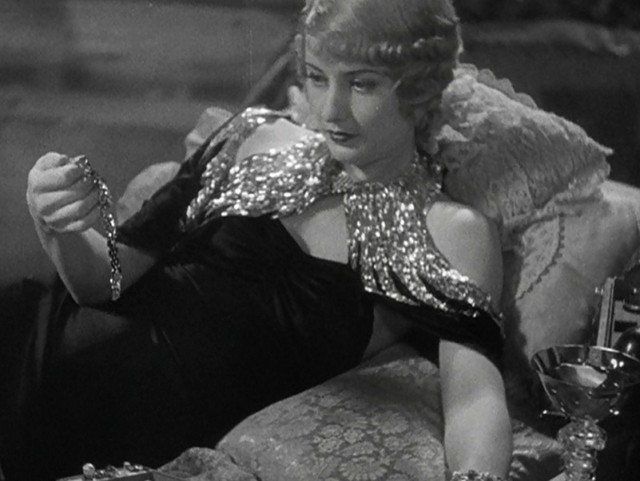
Given the corporate culture we've seen at Gotham Trust, it's no shock when Trenholm gets a telegram calling him back to New York: the bank has failed due to mismanagement and the board has decided to make him the scapegoat. Lily, on the other hand, has achieved everything she wanted: she has "Mrs." in front of her name and a nest egg of half a million dollars in bonds, securities and jewels, though she's looking forward to "getting the other half million".
Trenholm, on the other hand, needs bail money and funds to fight the board in court. He asks Lily for the money but she refuses, saying she's worked too hard for it: "I'm not like other women," she tells him. "All the gentleness and kindness in me has been killed." She asks Chico to pack her bags and meet her at the docks for the next boat back to Europe.
While waiting to sail, however, she has a change of heart and rushes back to find Trenholm wounded after a failed suicide attempt. She breaks down, sobbing, and in the ambulance promises to help him fight to clear his name, redeeming herself just as he comes around and smiles at her.
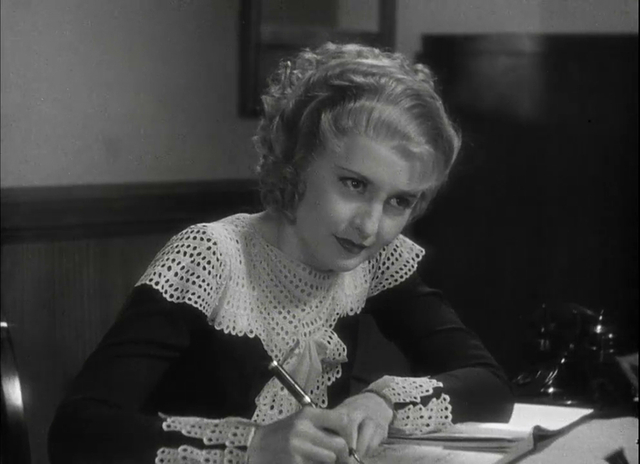
Code or no code, morality triumphs in the last moments of Baby Face, but that clearly still wasn't enough for the industry's censors. It didn't have to end this way: other pre-Code films like Ernst Lubitsch's Trouble in Paradise ended with their dodgy protagonists unredeemed, but Zanuck was a company man and director Alfred E. Green was no Lubitsch.
Born in 1889, Green began his career as a director in the silents, working with stars like Mary Pickford and Colleen Moore and marrying silent actress Vivian Reed. His filmography before Baby Face – titles like Back Home and Broke, Ella Cinders and Parachute Jumper – isn't notable and it didn't improve much in the years afterward, with films like The Merry Frinks, The Goose and the Gander and They Met in a Taxi.
After the war he made a specialty out of biographical pictures, directing The Jolson Story, The Fabulous Dorseys, The Jackie Robinson Story and The Eddie Cantor Story before retiring in 1954 – his last picture was Top Banana, starring Phil Silver and Rose Marie – and dying in Hollywood in 1960. Green was the sort of director studios loved, able to produce product for the assembly line without financial stress or drama; reliable yet still never able to ascend to the ranks of solid journeymen like Henry Hathaway or Michael Curtiz.
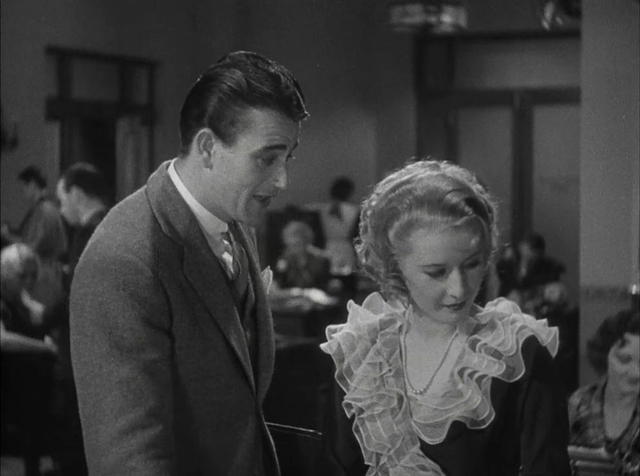
Posterity has judged that he's remembered, if at all, for a sordid but celebrated pre-Code picture that captured its star perfectly at a crucial moment in her evolution. (Green would work with Stanwyck again on A Lost Lady in 1934, but the moment was over, the Code was in effect and the film isn't a highlight in her career.)
Writing about Stanwyck in Complicated Women, Mick LaSalle she "was the fighter. No one but Stanwyck had such reserves of hurt and humiliation. Yet, conversely, no one was as unflappable. Stanwyck inhabited as wide an emotional range as James Dean, twenty-five years before Dean's first film, and she could access any of her emotions at a moment's notice."
It's not surprising that LaSalle, an apologist for the celebrated vitality and frankness of pre-Code pictures, has a preference for his vision of a primal, elementary Stanwyck, writing that "while it would be ridiculous to discount the last fifty years of Barbara Stanwyck's dazzling career, one does develop a taste – after watching Baby Face, Night Nurse, Ladies They Talk About, and other early films – for the straight-up, uncut, unwatered down Stanwyck we find at this stage."
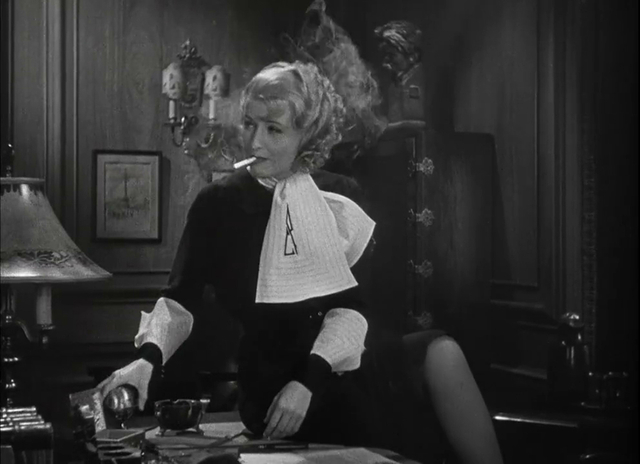
This is, of course, a matter of personal taste, but it's hard for me not to watch Baby Face like so many other pre-Code pictures – defined by its moment and by no means comparable to what would come after, even while writers, directors and actors were working under the rigorous constraints of the early Code years. In the end, give me the Stanwyck of The Lady Eve, Ball of Fire and The Furies, and nothing will convince me that Lily in Baby Face is nearly as malevolent as Phyllis Dietrichson in Double Indemnity.
Club members can let Rick know what they think by logging in and sharing in the comments below, as access to the comments section is one of many benefits that comes along with membership in the Mark Steyn Club.

